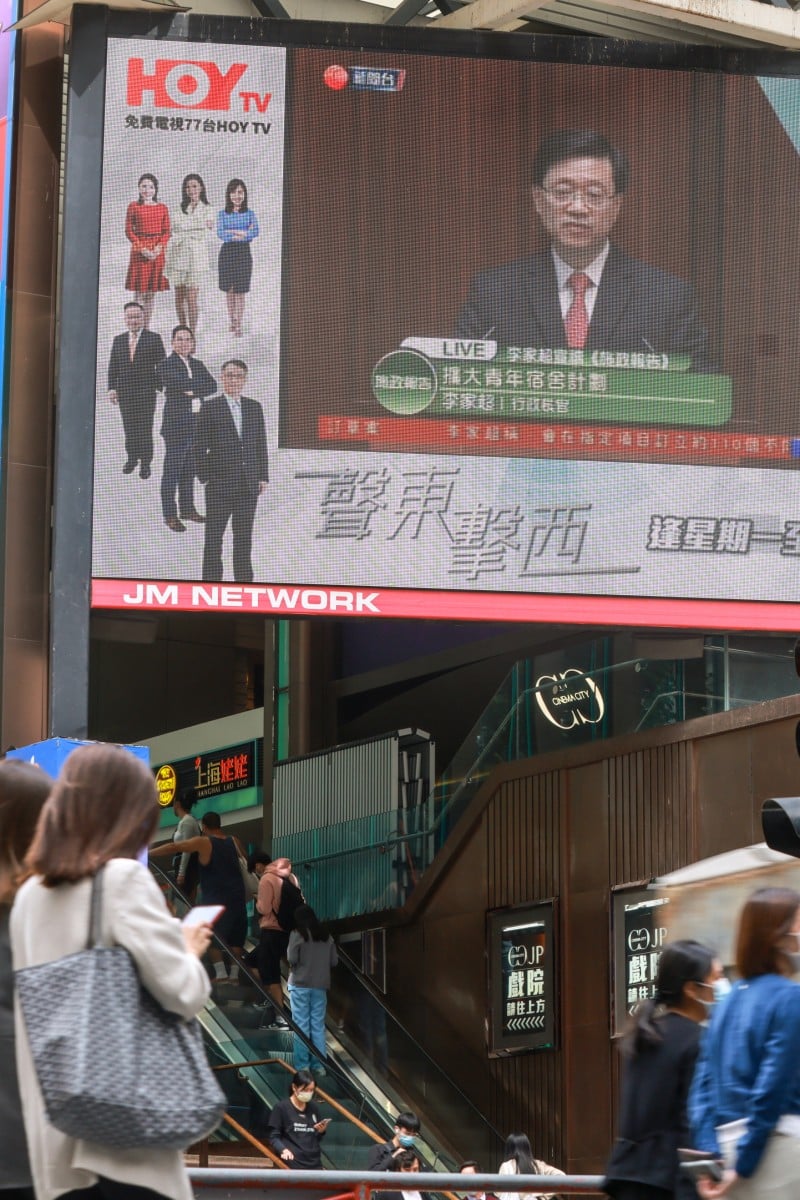
Hong Kong leader announces new visa scheme to ‘lure global talent’ amid brain drain
- Chief Executive John Lee said a new programme would grant two-year visas to people who have graduated from a top 100 university
- Incentives come amid an emigration wave that has seen the city’s workforce shrink by 140,000 people over the last two years
 Hong Kong Chief Executive John Lee Ka-chiu gave his first policy address today, announcing a new scheme to attract workers to the city. Photo: May Tse
Hong Kong Chief Executive John Lee Ka-chiu gave his first policy address today, announcing a new scheme to attract workers to the city. Photo: May TseChief Executive John Lee Ka-chiu announced a new visa scheme to “lure global talent” to Hong Kong in his maiden policy address on Wednesday.
The city’s leader rolled out multiple measures to tackle the worsening brain drain problem in the city, such as extending employment visas and launching the new Top Talent Pass Scheme.
“Apart from actively nurturing and retaining local talent, the government will proactively trawl the world,” he said.
Has Singapore become more competitive than Hong Kong?
The new scheme grants a two-year visa to people earning at least HK$2.5 million per year, as well as those who graduated from one of the world’s top 100 universities and have at least three years of work experience.
People who have graduated from these universities in the past five years will also be eligible, even if they have yet to fulfil the work experience requirement. The annual quota for these individuals is capped at 10,000.
Hriday*, a Master’s student from India studying in the United States, thinks the scheme is quite attractive and said he would consider coming to Hong Kong.
“Immigration requirements are usually the bottleneck. Getting an essentially free work visa would make the decision easier,” he said.
The 25-year-old student studying data science will graduate from the University of Washington (UW), ranked no 80 worldwide, next year.
While he hopes to stay in the US after graduation, securing a visa is difficult, even with a job.
“I get a three-year extension on my student visa if I can find a job because I’m studying in a STEM programme. After that, I need to get an H-1B visa through a lottery system, and my employer needs to be willing to sponsor the visa,” Hriday said, adding that he’ll need to leave the country if he doesn’t get picked in the lottery.
Hong Kong universities attract record number of mainland Chinese students
While he has never been to Hong Kong, he thinks the city would be a good place to explore work opportunities and appreciates its proximity to home.
“I’ve heard it’s easy to get long-term visas in Hong Kong and even residence permits,” he said.
Aamir*, on the other hand, questioned what would happen after the visa ended in two years.
“It gives you two years to look for a job. But I’m not sure how the visa laws work after that,” the Indian national, also studying at UW, said.
But the Master’s student said he would still consider coming to Hong Kong under the scheme.
“It is attractive because it feels like Hong Kong values highly talented and capable professionals … and this is also reflected in the salaries offered,” the 24-year-old said.
The incentives introduced on Wednesday to woo talent from around the world came on the heels of an emigration wave that has seen a mass exodus from Hong Kong. As a result, the local workforce shrank over the past two years by about 140 000.
Apart from the Top Talent Pass Scheme, Lee also relaxed the Immigration Arrangements for Non-local Graduates (IANG) by extending the limit of stay from one year to two.
Ziyu*, a recent non-local graduate from mainland China, welcomes the new policy.
The former Chinese University student currently works for a news outlet. Her IANG visa was issued this September and will expire next year.
Since her company cannot sponsor her work visa, she originally planned to apply for a Master’s degree next year so she could stay in Hong Kong.
“I would have been left with little choice but to leave the city, which saddened me as I enjoy living here, and most of my friends are here,” she said.
But now she is relieved to be given one more year.
“I’m no longer stressed about which way I should go, as I have been given one more year to explore different options and work opportunities.”
*full name withheld at interviewees’ request
